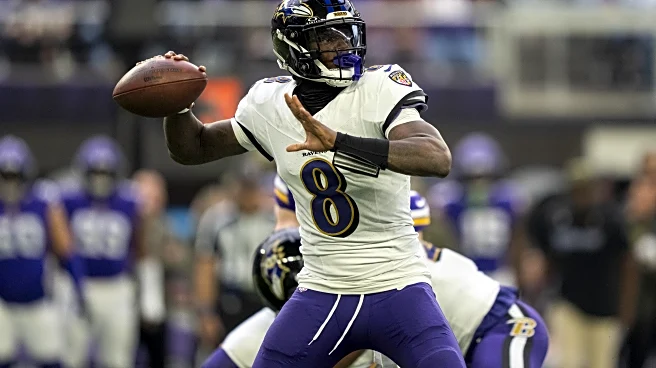The Ravens 27-19 win in Minnesota felt like another jolt of energy to a season that just three weeks ago, felt lost. After starting 1-5 on the year, the Ravens have won three straight games, and while the team as a whole doesn’t look as dominant as they did in 2023/24, they’re showing signs of life. Unsurprisingly, the Ravens recent string of wins has coincided with the return of two-time MVP quarterback Lamar Jackson. Despite the Ravens offensive line woes, Jackson has steadied the ship and reminded
everyone why he’s the most valuable player in the league.
Sunday proved to be yet another small step in Jackson’s continuous evolution as a quarterback. The Ravens haven’t looked like the offensive juggernaut they were in 2024, but games like Sunday are more reflective of a team that’s learning from its old mistakes and putting together cohesive game plans to counter the opponent. Case in point would be the Ravens high utilization of the short passing game against Minnesota. DC Brian Flores is known for his ability to heat up opposing quarterbacks and given the Ravens inability to protect Jackson this year, it was crucial that he got rid of the ball quickly. Jackson is currently being pressured at a 40% rate, the 6th highest in the NFL which is a notable increase from 2024 where Jackson was pressured at a 32.7% rate, which ranked 21st. To compound the problem, Baltimore’s once dominant run game hasn’t shown its face this year. In the past, the Ravens ability to bludgeon defenses and utilize play-action took an immense amount of pressure off of the offensive line and quarterback. On Sunday, Jackson adjusted. According to Next Gen Stats, Jackson threw the ball quickly (under 2.5 seconds) at the second highest rate of his career. The Vikings, who blitz at the second highest rate in the league (43.1%) upped the ante on Sunday, blitzing Jackson at an astounding 59% clip.
With the Ravens lackluster offensive line, the need for Jackson and the coaching staff to adjust their game plan will become crucial when they face elite defensive fronts like the one they’ll see in Cleveland next Sunday. Great QBs have traditionally been able to shift their play style to account for deficiencies on offense. For example, Chiefs QB Patrick Mahomes has found the ability to morph into a quick passing QB to counter poor offensive line and WR play, unlike the beginning of his career when he was frequently pushing the ball down the field.
If the Ravens truly want to make the playoffs and go on a run, it will be important for Jackson and the coaching staff to continue taking what the defense is giving them. Over the years, we’ve seen a failure from coaches and players alike to make in-game adjustments, particularly in big games. In playoff losses, a reoccurring theme has been opposing defenses making Jackson uncomfortable and an inability from himself and the coaching staff to not completely let the train run off the tracks. Against a well respected coaching staff in Minnesota, we finally saw signs of an offense that didn’t lose control and instead, shifted to a conservative game plan, understanding the flow of the game, and the inability of the Minnesota offense to do anything meaningful.
While it isn’t in Jackson’s nature to get rid of the ball quickly due to his elite playmaking and play extension ability, it might be time for him to shift to a more conservative play style as long as the Ravens offensive line continues to allow pressure at a high rate. Time will tell if the Ravens can regain their 2024 offensive form, but in the meantime, it’s a good sign that Jackson and Monken are adjusting to the circumstances, a reality that will become more crucial against elite coaches and competition.

















